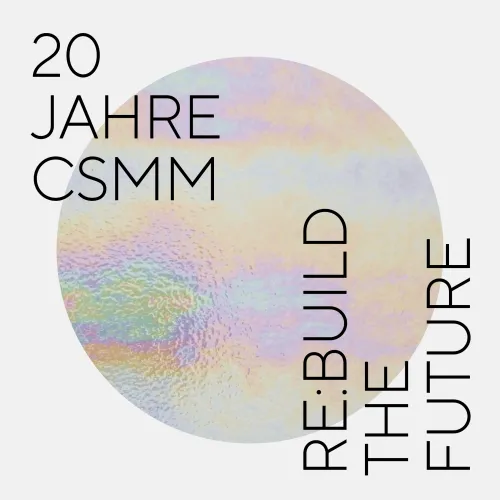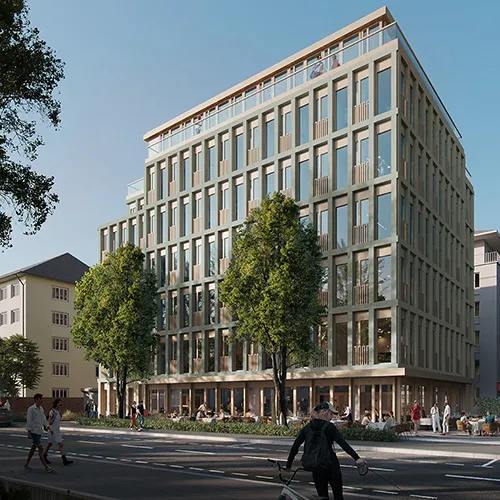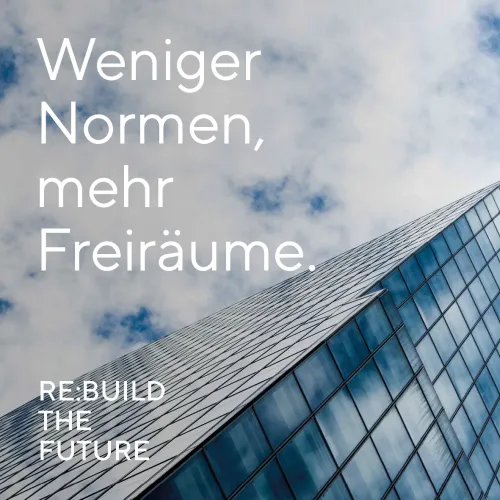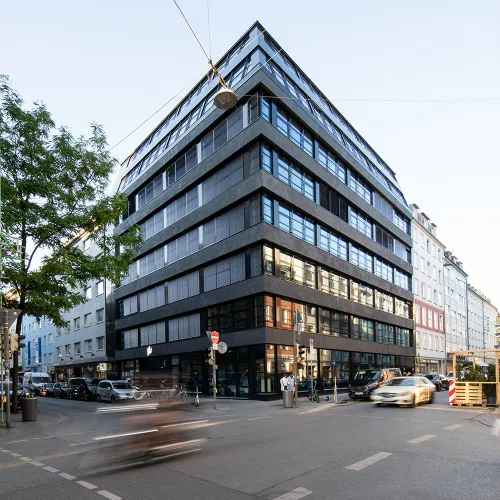Re:build the future! Stranded asset risk in commercial real estate: To avoid stagnation and devaluation, CSMM is calling for more competition in innovative redevelopment strategies for Germany’s vacant office buildings
Munich, 20 June 2023 | With staff working from home, online services of every description and a well-established commuter belt, society today is less dependent on urban centres. That puts suburban enclaves in the spotlight, where the increasing number of vacant office buildings offers huge potential for innovative redevelopment strategies. Timo Brehme, founder and managing partner of the architecture and consulting firm CSMM, and his team have made a name for themselves with visionary office architecture and pioneering workplace designs in Germany and abroad. Here, he shares his insights into the underlying causes of the recent disruption in office space and how stakeholders can rise to the challenge – provided they join forces and act fast. According to CSMM, the question is not only how to prevent the adverse structural, financial and societal impacts of empty suburban office parks, but also how upgrade these developments and create added value for everyone involved. CSMM is celebrating its 20th anniversary in 2023 under the banner “Re:build the Future” with proposals highlighting the untapped potential in today’s building industry.
Issue 1: Vacancies due to remote working and high operating costs
There has been a steady rise in vacant office buildings on the outskirts of our urban centres. More and more staff are working remotely since the pandemic, causing companies to significantly scale back their office footprints. At the same time, the cost of operating an office building is soaring and driving a renewed quest for efficiency gains in the workplace. According to the ifo Institute, the percentage of unused workstations in today’s offices has tripled since the start of the pandemic. Global real estate service provider Colliers expects vacancy rates to keep rising moderately in the medium term, as the recession dampens demand for office space for at least another year.
Issue 2: Empty offices drive stagnation and devaluation
The offices on the market today that have either outdated infrastructure or a substandard location tend to stay vacant for longer. Less than one in four office buildings in Germany meets the standards for a modern workplace, and around 62 percent of the existing building stock needs repositioning. “A lot of today’s real estate investors seem reluctant to modernise their office properties,” Timo Brehme points out. “They worry about whether they can retrofit an older property to modern energy-efficient standards, what unforeseeable risks could arise and, as a result, how much it will cost to get existing buildings up to code and regulation-compliant. At the same time, soaring interest rates have slowed deal-making activity to a record low.” According to BNP Paribas Real Estate, only 5.2 billion euros of commercial real estate was sold in the first quarter of 2023, down 74 percent on the previous year. “I think we all know why this is happening,” Timo Brehme warns, “but what we don’t know yet is how to prevent the existing building stock from losing value – particularly with the huge backlog of buildings that need modernising.”
CSMM’s recommended approach: Add value through versatile, multipurpose redevelopment
With more and more offices on the outskirts of Munich becoming vacant, CSMM is urging stakeholders to act fast and act now. Developers and architects have a real opportunity to develop sustainable strategies for large commercial properties that could ease overcrowding in our city centres. “We see a range of different opportunities to revert empty office buildings into purely residential use or to revitalise them as innovative multi-purpose developments,” explains Timo Brehme. “Done properly, there is huge potential for positive societal synergies in a smart mix of residential, commercial, childcare or assisted living spaces with all the retail and hospitality offerings a community needs to be self-sufficient.” CSMM believes that small-scale, hybrid developments could add diversity and density to the suburbs while providing much-needed housing. “We can improve quality of life in our cities, where the economy is already strong, by developing new, smaller urban centres on the outskirts with a high-quality liveable infrastructure of their own.”
Working together on redevelopment strategies that meet the community’s specific needs
The potential is there, according to Brehme: “So, our goal is to develop new realistic building models for multi-tenant mixed use.” That would allow developers to maximise the utility of the building stock and increase density while also revitalising both the empty buildings and the neighbourhoods around them. “When CSMM partners with developers and investors, our focus is on generating stable earnings and increasing property values, but we also care about making the most of the existing building stock through targeted, responsible and sustainable redevelopment.”
A plea for more innovation: simplifying design, construction and operation
Easier, faster, cheaper – this is what architects, investors and developers mean when they advocate for more innovative redevelopment strategies in the existing building stock. Burdensome planning applications, long drawn-out changes to land-use plans and the countless building code regulations for legacy buildings are restricting innovation and modernisation in the properties communities urgently need. “We are calling for policymakers to introduce Building Type E as quickly as possible,” says Brehme. As advocated by Germany’s Federal Chamber of Architects, this new building type would only be subject to the standards mandated by construction law and not those focused more on comfort. Building Type E could be added to the building code’s existing classification system and give property owners the flexibility to define the appropriate standards for each individual development in cooperation with their architects and builders. “Reducing the number of mandatory requirements would allow architects more creative freedom for innovative and sustainable solutions and give developers more financial leeway,” Timo Brehme argues. “If our goal is to prevent further urban sprawl, then we have to be smarter about how we use the building infrastructure we already have. That’s the best way to accommodate fluctuating demand while also adding value in a socially responsible way.”
CSMM’s key proposals
- To work with investors to create redevelopment strategies tailored to each specific neighbourhood
- To rethink urbanisation with initiatives that enable residents of all age groups to meet all their needs within the community and focus on community-driven development that creates high-value synergies over the long term
- To diversify risks within individual buildings by converting offices into a smart mix of residential, industrial, hospitality, life sciences and healthcare spaces
- To convince developers to keep an open mind and find flexible, versatile and efficient ways to use vacant properties
- To tailor each concept to the specific features of the site as well as its urban context, market environment and distinct regional identity
- To make new ESG legislation regarding embodied energy conservation into an opportunity to enhance both the image and the value of retrofitted properties. After all, revitalisation projects that comply with EU Taxonomy regulations are more attractive to investors than their non-compliant competitors – not to mention the benefits for developers of lower operating costs and overall higher building quality.
In 2023, CSMM is celebrating its 20th anniversary under the banner of “Re:build the future” to highlight the untapped potential in today’s building industry.
Media contact
hicklvesting
Contact: Nicole Vesting
Kurfürstenplatz 6, 80796 München
Tel: +49 (0)89 45 23 508-11
Fax: +49 (0)89 45 23 508-20
E-Mail: nicole.vesting@hicklvesting.com
CSMM Contact
CSMM – architecture matters
Contact: Nina Eisenbrand
Werk 3, Atelierstraße 14, 81671 München
Tel.: +49 (0)89 960 15 99-0
Fax: +49 (0)89 960 15 99-99
E-Mail: marketing@cs-mm.com







